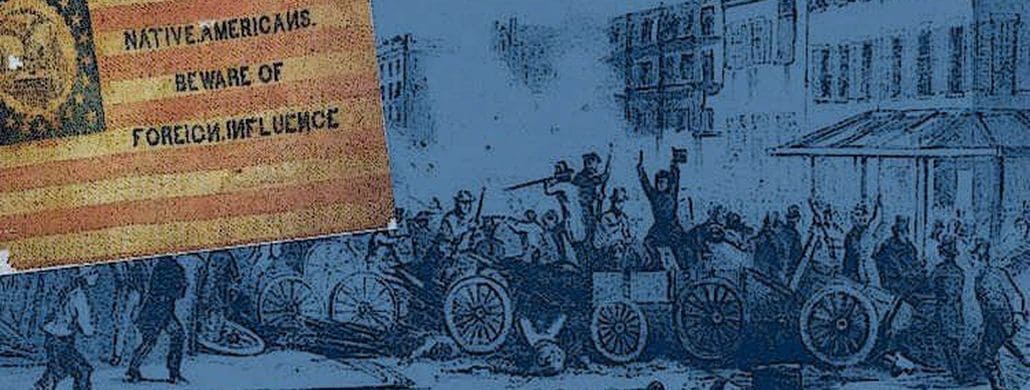
[America, around 1850] Lorenz, the Forty-Eighter, had settled in well. He had met all members of his American family and was eager to learn about the country and its people. Moreover, he had found his personal happiness.
Annelie, Heinrich’s daughter, was the woman of his life. With her, he would soon take over the Merry Dragon Inn. His Irish protégés felt at ease as well. They lived in a small house nearby and mother Heather, a skilled seamstress, helped with the washing and mending in the “Merry Dragon” inn. More than that, she had insisted on making new curtains and table cloths. They were exquisite and soon her skills were so well known that she could open her own business. But the orders from the Merry Dragon Inn remained her favorite ones. “From revolutionary to innkeeper”, Lorenz thought, a bit sarcastic, “what a career.” But the Merry Dragon Inn had long become more than a place where one could eat, drink and spend the night. It was a meeting place – here all guests were welcome, as long as they were honest and tolerant people.
“Whose country is this, anyhow?” Nativists and immigrants (1850, America)
That could not be taken for granted in those days. As a reaction to the massive influx of immigrants, a nativist movement had formed. These people demanded that whites born in America should be better off than immigrants. Their political arm became the anti-Irish-Catholic American Party, better known as “Know Nothings”. They claimed severe limits on immigration and a long time of waiting for immigrants to become American citizens.
“Here we all are a community, but it’s not like here in other parts of the country,” Heather said to Lorenz one evening. “Most Irish are Catholics, that alone causes distrust. The nativists consider them to be subjects to the Pope in Rome and hostile to American values. Many Americans also fear that the Irish will take away their jobs, since they accept even the hardest and most dangerous work for low wages. Sometimes anxiety even leads to hatred. I’ve heard from New York that there are fights for dominance in slum areas.”*
Leaving home is not easy
“As if it was easy to leave one’s homeland,” Lorenz thought. For many desperately poor people emigration was the last resort. After poor harvests in the years 1845 and 1846, the prices for staples food such as bread and potatoes had raised many times over. In many areas the government could hardly help, and the municipalities did not have the money to assist needy families. 1845/1847 – 1855 the biggest mass emigration of the 19th century to North America occurred, 80,000 people alone in 1847.
A strong bond
For all his happiness with Annelie and the “Merry Dragon”, the thought of his German family living in exile troubled him greatly. Then Hubert died, and Lorenz was devastated. “You have a very strong bond”, Annelie said softly. “I pray that they are safe, and that we will see them again. Papa and Uncle Niklas would love that very much too.” “Yes, we do have a strong bond,” Lorenz answered. “A relative runs the ‘Stübchen’ while the family is away. Cousin Emil often comes after school, he pretends to be concentrating on his homework while he is keeping an eye and an ear on what is said about the family. That sound very much like Emil,” he said with a crooked smile.
Then a letter from Hubert’s widow Henriette arrived. “Hubert always wanted you children to learn and stand up for your ideas and values,” Lorenz read. “He was so proud of you! Anni has an excellent job in an elegant Brussels atelier, Sophie and Hans go to school here and get a good education. Go on with your life, my dear boy, and be happy.” When Lorenz and Annelie got married, they received a parcel from Brussels. It was a gorgeous lace table cloth crocheted by Anni, dedicated to their happiness.
Home from exile
It took another couple of years before good news arrived. Prince Wilhelm of Prussia, who had crushed the rebellion in 1849, was now governor-general of Rhineland and Westphalia, living in Coblenz with his wife Augusta. Gradually, his staunch conservatism had softened. In fact, he had even fired the hardliner Oberpräsident (head of administration in Prussian provinces) of the Prussian Rhine Province, to the relief of many Rhinelanders.
Finally, Lorenz’ German family came back. Henriette was granted to see her “Stübchen” again. Hans became a captain on a Rhine steamer like his father, and Sophie a hatmaker at “Madame Charlotte’s” in Bonn. She also continued the family tradition to make new and chic things from used materials. It was a difficult new beginning, since both Sophie’s family and Madame Charlotte were well known as democrats. Therefore, many rich clients feared that shopping at Madame Charlotte’s would ruin their husbands’ careers. But then Sophie and Anni presented their creations at a celebration in the Coblenz Rhine gardens in honor of Princess Augusta, attended by the Princess herself and her ladies in waiting, and caught their attention. From then on, the business went through the roof. That day, Sophie also met the love of her life – Count Andras Csabany, son of an Austrian diplomatic family.
* The theme of “Gangs of New York”

Be the first to comment